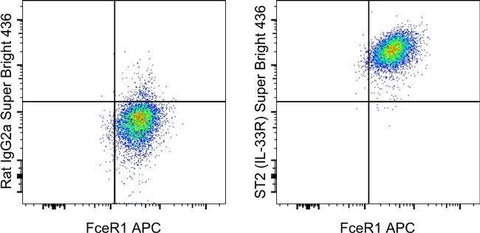
IL-33R (ST2) Monoclonal Antibody (RMST2-2), Super Bright™ 436, eBioscience™
View Cart or Continue shopping.
Description
PRODUCT DETAILS
Host: Rat
Isotype: IgG2a, kappa
Clonality: Monoclonal
Clone: RMST2-2
Format: Super Bright™ 436
Reactivity: Mouse
Application: Flow Cytometry
Tested Dilution: 1 µg/test
Concentration: 0.2 mg/mL
Storage: 4° C, store in dark, DO NOT FREEZE!
Formulation: PBS, pH 7.2, containing 0.09% sodium azide
Purification: Affinity chromatography
Data Sheet: TDS
Specific Information
Description: The RMST2-2 monoclonal antibody reacts with ST2, also known as IL-33 receptor (IL-33R) or interleukin 1 receptor-like 1. ST2 is a member of the IL-1 receptor family. In the membrane-bound form, it consists of three extra-cellular immunoglobulin domains and an intracellular toll-interleukin-1 receptor domain. ST2 forms a dimer with IL-1R accessory protein in a ligand-dependent manner. The IL-33/ST2 interaction induces the production of TH2 cytokines. ST2 also has a soluble isoform lacking transmembrane and intracellular toll-interleukin-1 receptor domains. It is believed that the soluble form functions as a decoy receptor that can block membrane bound IL-33/ST2 interaction. ST2 is expressed by TH2 lymphocytes, mast cells, eosinophils, basophils, innate lymphocytes, smooth muscle cells, and endothelial cells and is involved in host defense, allergy, and inflammation. The IL-33/ST2 interaction has also been shown to be atheroprotective.
Applications Reported: This RMST2-2 antibody has been reported for use in flow cytometric analysis.
Applications Tested: This RMST2-2 antibody has been tested by flow cytometric analysis of mouse bone marrow-derived mast cells. This can be used at less than or equal to 1.0 µg per test. A test is defined as the amount (µg) of antibody that will stain a cell sample in a final volume of 100 µL. Cell number should be determined empirically but can range from 10^5 to 10^8 cells/test. It is recommended that the antibody be carefully titrated for optimal performance in the assay of interest.
Super Bright 436 can be excited with the violet laser line (405 nm) and emits at 436 nm. We recommend using a 450/50 bandpass filter, or equivalent. Please make sure that your instrument is capable of detecting this fluorochrome.
When using two or more Super Bright dye-conjugated antibodies in a staining panel, it is recommended to use Super Bright Complete Staining Buffer (Product # SB-4401) to minimize any non-specific polymer interactions. Please refer to the datasheet for Super Bright Staining Buffer for more information.
Excitation: 405 nm; Emission: 436 nm; Laser: Violet Laser
Super Bright Polymer Dyes are sold under license from Becton, Dickinson and Company.
For Research Use Only. Not for use in diagnostic procedures. Not for resale without express authorization.
